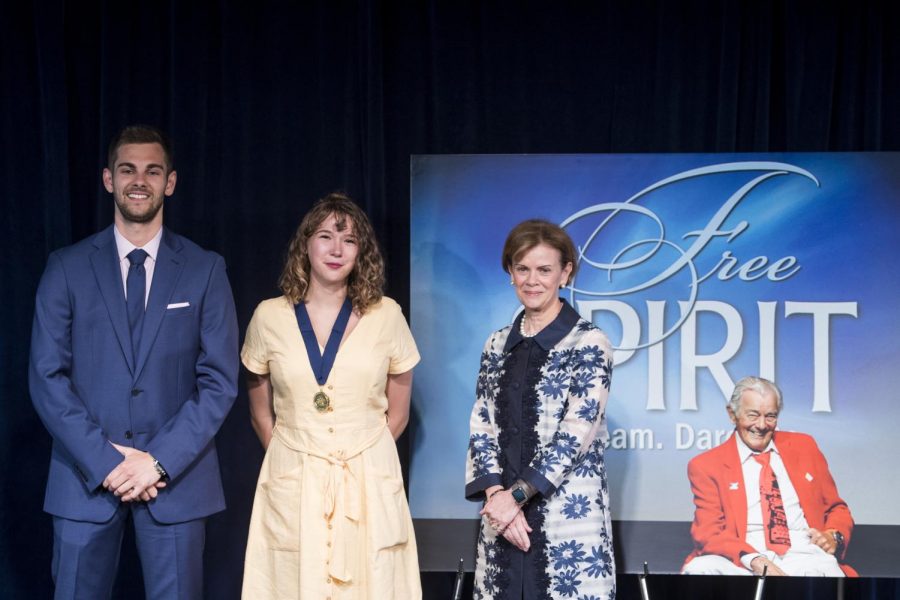American identity depends upon Freedom of Speech
Journalism conference confirms that the First Amendment makes all U.S. freedoms possible
Courtesy of Freedom Forum Institute. Reposted with permission.
A..J. Neuharth and Jan Nueharth recognize senior and Shield editor in chief Sophie Ryland for being the Texas delegate at the commencement ceremony of the Al Neuharth Free Spirit and Journalism Conference, a program in Washington D.C. for rising high school seniors interested in pursuing journalism, held on June 20 at the Newseum.
November 27, 2018
“Congress shall make no law respecting an establishment of religion, or prohibiting the free exercise thereof; or abridging the freedom of speech, or of the press; or the right of the people peaceably to assemble, and to petition the government for a redress of grievances.”
Those words in the First Amendment, arguably the most important part of the U.S. Constitution, spell out the most basic premise of the promise of America. And this past summer I had the opportunity to learn more about and explore what these promises really mean. As the sole representative from Texas for the Al Neuharth Free Spirit and Journalism Conference, a program in Washington D.C. for rising high school seniors interested in pursuing journalism, I arrived at the conference expecting practical lessons on writing and reporting. After an action-packed week, I left with a reaffirmed belief in the importance of the press and the power of the First Amendment. As an added bonus, I gained 50 new friends, each who taught me something different about what it is to be an American.
Upon arriving, they asked each of us to deliver a speech on which aspect of the First Amendment was most important to us, and why. Here is the full text of my response:
“The most important right defined in the First Amendment is the freedom of speech. Yes, it may be the most popular and obvious answer, but it is deservedly so. Our Founding Fathers recognized that without citizens who freely criticize the government, truth would not be able to hold the powerful accountable. Speech also enables us to advocate through the other First Amendment rights; we can discuss our differing religions, talk openly in the press, assemble to make our voices heard and guarantee that those listening hear us clearly through our petitions. Thus, with freedom of speech, America truly became a democracy. It is the cornerstone of our identity, underscoring our intellectual, social and cultural life as a nation. Our motto, E Pluribus Unum, defines America as the sum of her individual parts. And when those individuals have the power to speak freely about who they are and in what they believe, we grow as people and as a country.”
Over the following week, this belief was reinforced time and time again. We heard it when we attended a live taping of Meet the Press and had the chance to talk with the host, Chuck Todd, after he interviewed Kellyanne Conway, discussing the policy of separating children and parents at the border. We heard it when talking with Charles Haynes, the founding director of the Freedom Forum Institute, as he offered advice on advocating for freedom through journalism. Mr. Haynes underscored the importance of advocating for and covering civil rights in the media.
“Our world cannot wait,” he said. “We need your voice, your action, your courage.” We heard it when listening Washington Post reporter (and native Texan) David Fahrenthold, who recently has been reporting on the Trump Foundation investigations. He discussed the difficulty of covering presidential investigations, but stressed the importance and impact of doing so, and urged us to be stubborn in both our values as reporters and our tenacity in sticking with a difficult story.
While participating in a Q&A session with Mike McCurry, the former press secretary for President Clinton, who notably endured the Lewinsky scandal, he stressed the importance of responsible reporting.
“Speed kills” he said, later adding,” “Who cares if someone else gets the scoop? … Concentrate on writing brilliantly on factual things.”
This sentiment was later underscored while on our private tour of the Press Galleries in the Capitol. Winding through the special chambers reserved for the press, we were front row witnesses to professional journalists, who politely ignored us as they diligently and quickly typed away at their laptops, having earlier observed the Senate meeting over the child separation policy.
The fast-paced, fascinating series of lessons were non-stop. Senior U.S. District Judge Royce Lamberth stressed the importance and rights of journalism when it comes to the First Amendment. Sara Ganim of CNN, who broke the Jerry Sandusky scandal as a junior reporter in Pennsylvania, shared her wisdom. And Doug Mills, one of the top photographers at The New York Times, closed out our sessions by sharing his experience covering every U.S. President since President Reagan.
Every guest shared something different and exciting about what it’s like to be a journalist covering difficult topics in this day and age.
The lessons were underscored by the uniquely appropriate venue. Gathered in front of the Newseum’s Journalists Memorial, which pays tribute to those who have died in service of journalism, Courtney Radsch, advocacy director for the Committee to Protect Journalists, shared that even though it is a dangerous job, reporting with a fair and informed lens is one of the most important services for a socially and civically aware society. It was a sobering, but inspiring moment, as we honored those who had died in pursuit of such a society.
Perhaps the biggest highlight was the moving presentation on the Freedom Rides, where two of the original Riders, Joan Mulholland and Dr. Ernest Patton, spoke to us on their fight for civil rights, recalling what the media did well and also what they wished they had done better. Their talk engendered a respect for those who have fought for a better world throughout history and a resolve to be a part of those who will fight in the future.
“What you do is not for today, but for the generations after you,” Dr. Patton shared, “so get busy, and stay busy.”
By week’s end, our cohort had become life-long friends, bonded by what we had shared and learned. We were recognized by Al Neuharth’s family and the administration of the Freedom Forum at our commencement ceremony, where Jan Neuharth, Al Neuharth’s daughter, quoted her father as she told us: “The First Amendment guarantees the right to a free press. We in the media must make sure it is a fair press.”
Reflecting upon this experience now, months later, I have three main takeaways. First, any high school junior who has even the slightest interest in media, journalism or public policy should apply immediately. Not only is it an incredible learning and career opportunity, you’ll make lifelong friends (and in doing so, learn the many different ways people in America pronounce things). Applications are available on the Freedom Forum Institute’s website here (and it is important to note that this an all expenses paid opportunity for those selected, and graduates of the program receive a college scholarship).
Second, having met those aforementioned lifelong friends, I feel so much more confidence in our generation’s future. Every time I read some think piece about how we’re the laziest, most entitled generation yet, all I have to do is think of the bright, ambitious and kind people I met through this program and I am able to simply laugh at the mischaracterization and underestimation of our generation.
Finally, and most important of all, I can confirm that journalism is more important and stronger than ever. Meeting with journalists who had uncovered such vital stories and who had made such a difference in their communities reminded me that even though journalists are plagued with accusations of “fake news,” threatened and impeded in attempts to stifle their reporting, or even worried for their personal safety, modern journalists are fighting hard to deliver information to the public, with tools and information available to them that they’ve never had before.
The importance of protecting and upholding the First Amendment remains our biggest priority as a nation, and the Fourth Estate of the news media is facing that responsibility with the dignity and importance it deserves. And the Al Neuharth Free Spirit and Journalism Conference is playing a vital role in preparing the journalists of tomorrow to take up the mantle and continue to shine a light on democracy to ensure it exists for future generations.
[Best_Wordpress_Gallery id=”10″ gal_title=”neuharth”]





AJ Ryland • Nov 28, 2018 at 4:54 pm
Juniors need to apply to this amazing program!!!